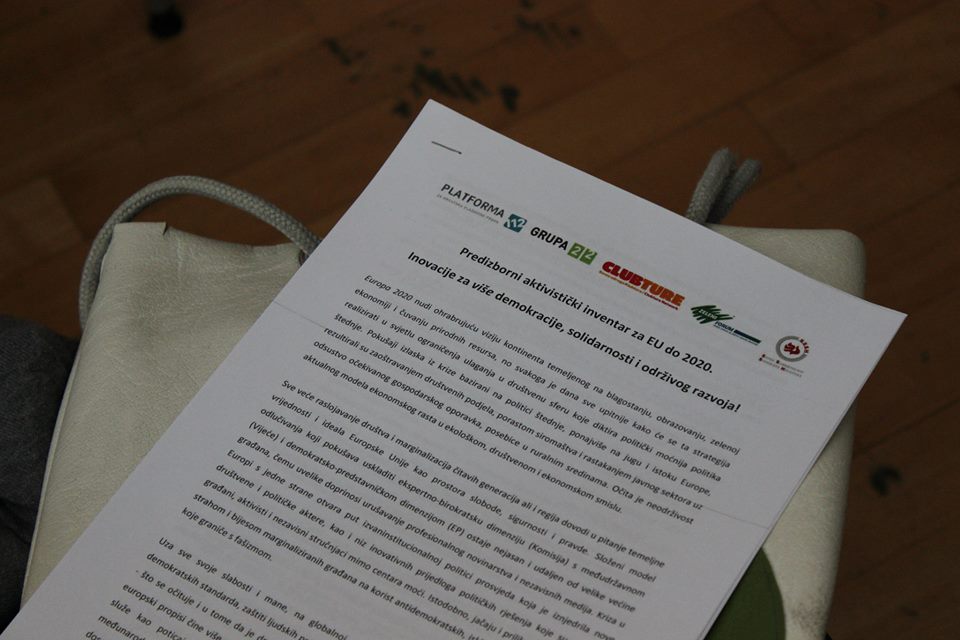Platform 112, Union of Autonomous Trade Unions of Croatia, Group 22, Clubture and Green forum presented the “Pre-election activist inventory for the EU by 2020.” It’s about the alternative propositions and innovation policy for higher democracy, security, and sustainable development in the new mandate of European Parliament and European Commission. They invited candidates for European Parliament to discuss their support of the propositions and how they will promote them in the sphere of European politics.
Europe 2020 offers an encouraging vision of the continent based on the well-being, education, green economy and the preservation of natural resources, but every day it becomes more and more questionable how this strategy will be implemented in light of restrictions on investment in the social sphere dictated by politically powerful policies. Attempts out of the crisis based on a policy of reduced spending, mostly in Southern and Eastern Europe, have resulted in the escalation of social divisions, increased poverty and fragmentation of the public sector in the absence of the expected economic recovery, particularly in rural areas. There is an obvious unsustainability of the current model of economic growth in the environmental, social and economic terms.
The increasing stratification of society and the marginalization of entire generations, but also the region, call into question the fundamental values and ideals of the European Union as an area of freedom, security and justice. The complex model of decision-making that attempts to harmonize expert bureaucratic dimension (Commission) with the interstate (Council) and the democratic-representative dimension (EP) remains unclear and away from the majority of the population, which greatly contributes to the collapse of professional journalism and independent media. The crisis in Europe on the one hand opens the way for non-institutional politics protests that gave rise to new social and political actors, as well as a number of innovative proposals that political solutions are designed citizens, activists and independent experts by the centers of power. At the same time, however, opportunities for the manipulating marginalized citizens with fear and anger have grown stronger, in favor of anti-democratic, exclusionary politics options, which border on Fascism.
Despite all its weaknesses and shortcomings, the European Union, on the global stage, is on the forefront of advocating democratic standards, human rights, environmental care and responsibility for reducing poverty – which is reflected by the fact that it is the second largest donor to developing countries. At the national level, European regulations make up more than three-quarters of domestic legislation in many areas and continues to serve as an incentive to improve the quality and transparency of state institutions. In international politics and trade relations, Europe is facing pressures to lower social standards.
This mandate of the European Parliament and the Commission is crucial for the realization of the vision of sustainable development based on rapid and socially-just transition towards a low-carbon emission, increased investment in innovation, research, development, education, and training. These are the main strategic points of the Europe 2020 strategy, but without strong political will on top of a compromise, it will be impossible to accomplish.
By 2020, if there is enough political honesty, creativity and dialogue, the European Union can make a turnaround by:
• Construction of a European public sphere of political debate in which all the citizens participate equally.
• Building confidence in politics as an honorable public work, with the best interests of the citizens.
• Development model based on sustainable production and consumption, and not necessarily on economic growth alone.
• The safety and dignity of labor to the creation of new and better jobs and a more equitable distribution of national income.
• Sustainable, equitable and democratic management of public and common good;
• Strategic investments as a basis for social development – education, culture, science, media and social inclusion.
• Uncompromising protection of human rights and the alleviation of poverty around the world
The proposals, which were jointly developed by civil society organizations gathered around the Platform 112 in collaboration with the Union of Autonomous Trade Unions of Croatia, Group 22, Clubture and Green forum and Croatian Platform for International Citizen Solidarity (CROSOL), are addressed to all candidates in elections for European Parliament.
